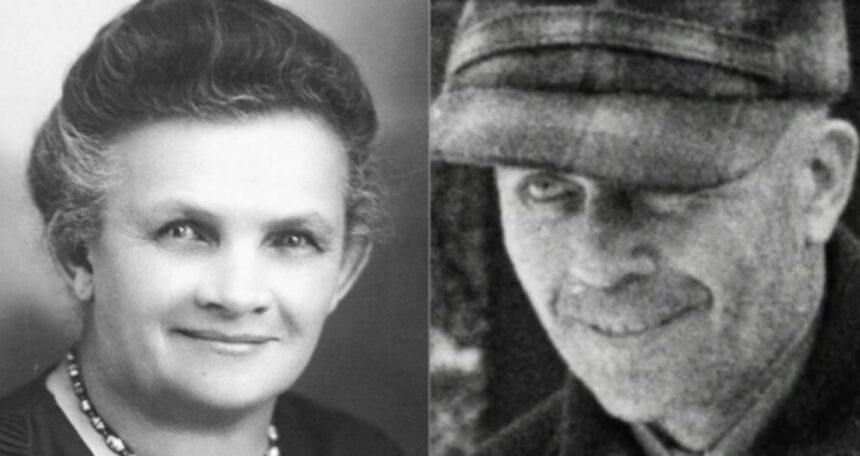The Chilling Bond: Ed Gein’s Psychological Entanglement with His Mother
Ed Gein’s name has become synonymous with some of the most disturbing crimes in American history, but to understand the monster, one must first examine the psychological prison that shaped him. At the center of this twisted narrative lies one of the most chilling mother-son relationships ever documented—a bond so suffocating and psychologically destructive that it continued to exert its malevolent influence long after death had severed the physical connection.
The Foundation of Control
Augusta Wilhelmine Gein was not merely a strict mother; she was an architect of psychological imprisonment. Born Augusta Wilhelmine Lehrke in 1878, she grew up as one of eight children in a family of German Old Lutherans from Prussia—a faith far more conservative than mainstream Lutheranism. This religious background shaped her belief that all humans were infected with sin in both thought and deed, and that they deserved to burn in Hell.
In 1915, disgusted by what she saw as the sinful nature of La Crosse, Wisconsin, Augusta moved her family to an isolated farmhouse near Plainfield. There, away from the corrupting influence of the outside world, she could raise her sons according to her rigid moral code. She preached to Ed daily about the evils of women, the corruption of the flesh, and the sinfulness beyond their property lines. The boys were forbidden from leaving the farm except to attend the nearby one-room Roche-a-Cri grade school, which had only 12 students.
What made Augusta’s control particularly insidious was how she convinced Ed that her love was conditional upon his complete submission to her will. When Ed was 12 years old and Augusta discovered him masturbating in the bathtub, she grabbed his genitals and called them “the curse of man.” She alternated between vicious criticism and possessive affection, creating a psychological dependency that would prove impossible for Ed to break—even in death.
Ed, already struggling with a lazy eye and a speech impediment caused by a lesion on his tongue, found himself increasingly isolated from his peers. Other children shunned him at school, and when he tried to make friends, Augusta punished him for socializing. She demanded that both her sons remain virgins, warning them that sex would lead to damnation. By the time Ed reached adulthood, his mother’s voice had become so internalized that it functioned as his primary psychological compass.

The Unbreakable Chain
The family dynamics became even more disturbing in May 1944 when Ed’s older brother Henry died under mysterious circumstances while the brothers were clearing vegetation by controlled burning. Despite claiming he had lost sight of Henry during the firefighting efforts, Ed led police directly to his brother’s body. Strangely, Henry showed no signs of burns, but had severe head bruises. The death was ruled accidental asphyxiation, but Henry had previously expressed concerns about Ed and Augusta’s unhealthy relationship—criticism that mortified Ed.
When Augusta suffered her first stroke shortly after Henry’s death, Ed became her caretaker, a role that only deepened their unhealthy codependency. For a man who had never been allowed to develop his own identity, caring for his incapacitated mother became his entire reason for existence. During this period, Ed began reading books about disturbing topics including head shrinking, grave robbing, and human anatomy. The boundaries between Ed’s sense of self and his mother’s needs had already blurred beyond recognition.
Augusta’s death on December 29, 1945, at age 67, should have been Ed’s liberation. Instead, it became the catalyst for his complete psychological collapse. The woman who had dominated every aspect of his life for thirty-nine years was gone, but the psychological architecture she had built within his mind remained horrifyingly intact. Ed immediately sealed off Augusta’s bedroom and sitting room, preserving them exactly as they had been on the day she died.
Voices from Beyond the Grave
In the days and months following Augusta’s death, Ed began experiencing what he described as hearing his mother’s voice. These weren’t fleeting memories or wishful thinking—they were vivid, commanding auditory experiences that felt as real and immediate as when Augusta had been alive. The voice carried the same authoritative tone, the same moral certainty, and the same capacity to fill Ed with both terror and desperate need for approval.
The voice commanded him to preserve her memory, to keep her room exactly as she had left it, to maintain the farm as a shrine to her existence. But most chillingly, the voice began to issue increasingly disturbing directives about how Ed should interact with the world—particularly with women, whom Augusta had taught him to both fear and despise.
The Psychology of Auditory Control
What Ed experienced was likely a severe form of prolonged grief complicated by his pre-existing psychological damage. Mental health experts who have studied the case suggest that Ed’s “conversations” with his dead mother represented a dissociative response to trauma—his psyche’s desperate attempt to maintain the only relationship that had ever given his life structure, however toxic that structure had been.
The voice wasn’t simply Ed’s imagination run wild. It carried specific characteristics that made it feel external and authoritative. It would criticize his behavior, demand explanations for his actions, and express disappointment in ways that perfectly mirrored Augusta’s living patterns of emotional manipulation. For Ed, his mother’s death had not ended their relationship—it had transformed it into something even more terrifying because now her influence could never be questioned, challenged, or escaped.
The Macabre Preservation
Driven by these internal voices and his overwhelming need to somehow resurrect the maternal relationship that had defined his existence, Ed began his descent into acts that defied comprehension. He sealed off Augusta’s bedroom and sitting room, preserving them exactly as they had been on the day she died. He would sit in these rooms for hours, conducting conversations with the invisible presence he felt so powerfully.
But preservation of her physical spaces wasn’t enough. The voice, as Ed described it, began demanding more tangible forms of connection. In 1947, Ed reportedly began experiencing strange visions that compelled him to visit the graveyard where his mother was buried. There, according to his later confessions, he started by digging up Augusta herself, twisting her head from her body with his bare hands and attempting to shrink it using techniques he had read about in his anatomy books.
This psychological need eventually led to his systematic nocturnal visits to local graveyards, where he would scan obituaries for recently deceased women who resembled his mother, then exhume their bodies. In Ed’s fractured mind, these acts weren’t desecration—they were attempts to reconstruct the maternal presence that the voice insisted he needed to maintain. He began crafting what he called a “woman suit” from these body parts, believing that by wearing it, he could literally “become” his mother.
The Horror of Psychological Immortality
Perhaps the most chilling aspect of Ed Gein’s relationship with his deceased mother was how it demonstrated the terrifying power of psychological imprinting. Augusta had so thoroughly colonized her son’s mind that death could not diminish her influence. If anything, death had made her more powerful by removing any possibility that Ed might eventually rebel against or outgrow her control.
The voice Ed heard wasn’t just memory—it was a psychological parasite that continued to feed on his desperate need for maternal approval while simultaneously punishing him for that very need. It created an impossible psychological equation: he could never satisfy the voice’s demands, but he could never stop trying to do so.
Legacy of Psychological Terror
Ed Gein’s crimes shocked the world not just because of their gruesome nature, but because they revealed the horrifying extent to which early psychological damage can warp human development. The relationship between Ed and his mother serves as a case study in how love can become a weapon, how protection can become imprisonment, and how the bonds between parent and child can become chains that bind beyond the grave.
The most disturbing lesson from Ed Gein’s story isn’t just what he became, but how completely he remained his mother’s son even in his most monstrous acts. Every crime he committed was, in his fractured mind, an attempt to fulfill the demands of the voice that had never stopped speaking to him. Augusta Gein had achieved a form of psychological immortality that continued to claim victims long after her own death.
Understanding this dynamic doesn’t excuse Ed Gein’s actions, but it does illuminate the terrifying reality of how profoundly childhood psychological abuse can distort human development. The voice that haunted Ed Gein serves as a reminder that some forms of control are so complete, so psychologically totalitarian, that they can transcend death itself—creating monsters that are, in many ways, still obeying the commands of ghosts.


Leave a Reply